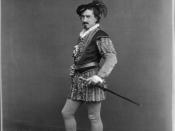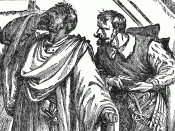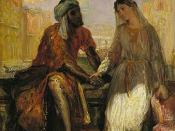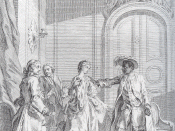My personal response to Othello has been completely shaped by Shakespeare's characterization of Othello. The themes and ideas that Shakespeare tried to convey through the play are all done through the characterization of his characters.
Othello is predominantly a traditional Shakespearean tragedy shadowed with post-colonial aspects. This view is supported and demonstrated through the characterization of Othello in Othello.
Through Othello's characterization you are able to tell that Othello is a tragic hero and that Othello is in fact a traditional Aristotelian tragedy. First of all, in Shakespearean tragedy, you will be dealing with a man of high estate: a king, a prince, a general, etc. Normally, you will hear about him from others before he makes an entrance in the play. Often, this is where you are given the first impression of the greatness of the tragic hero through the eyes of others.
Act 1 Scene 3 47Duke: "Valiant Othello we must straight employ youâ¦"Act 1 Scene 3 167Othello: "And sold to slavery; of my redemption thus."Act
1 Scene 3 286Duke: "Your son-in-law is far more fair than black."Within the first two acts or so, you become aware of a driving force within Othello that is almost, if not entirely, obsessive in nature. You also witness the nature of the inner torment he goes through as he follows his obsession. You see both Othello's greatness as a general and human being and his naive, trusting nature that so easily becomes twisted into an obsessive jealousy by Iago.
Act 3 Scene 3 167-172Iago: "O beware, my lord, of jealousy;It is the green-eyed monster which doth mockThe meat it feeds on. That cuckold lives in blissWho certain of his fate loves not his wronger;But O, what damned minutes tells he o'erWho dotes, yet doubts, suspects, yet fondly loves.
Contributing to, and furthering the obsession and the control of the tragic flaw are misunderstanding, supernatural suggestion, and accident or chance. Things happen a split second too late: the hero operates on what he believes to be the case rather than what he actually knows to be the case. Soon they are one and the same thing to him.
Act 4 Scene 2 81Othello: "Are you not a strumpet?"As the flaw and the misunderstandings continue, new conflicts and complications arise which bring about the death or gradual alienation of all forms of support for Othello, so that by the end, he must face the opposing forces and the responsibility for his actions alone. Othello is confronted with the knowledge that he has erred, that he had misunderstood the situation, that all the tragic events that are happening now or that has happened is in fact, all his fault. Knowing that he alone is to blame, he alone has erred, and accepting it is absolutely necessary in Shakespearean tragedy - tragic recognition.
Act 5 Scene 2 269-279Othello: "Now, how dost thou look now? O ill-starred wench!Pale as they smock! When we shall meet at comptThis look of thine will hurl my soul from heavenAnd fiends will snatch at it. Cold, cold, my girl,Even like thy chastity.
O cursed, cursed slave! Whip me, ye devils,From the possession of this heavenly sight!Blow me about in winds! Roast me in sulphur!Wash me in steep-down gulfs of liquid fire!O Desdemon! Dead Desdemon! Dead! O! O!What you see during this process of alienation and isolation is suffering, sleeplessness, rage, confusion, hallucination, and violence as the internal conflicts intensify to an almost unbearable pitch.
Act 4 Scene 1 37-38Iago: "My lord is fallen into epilepsy.
This is his second fit; he had one yesterday.
Tragic recognition inevitably takes place when there is no chance/time to correct the error: it is too late. Once recognition occurs, death speedily follows. Othello provides you with a particularly moving display of courage or at least nobility of heart. With this kind of display, you are left with the feeling that indeed Othello was a monster who should have been destroyed, accompanied by a kind of melancholy recognition on our parts that he also had greatness in him: nobility, strength, courage. It makes you regret the waste and tragedy of Othello, you are reminded of what could have been if only he hadn't erred from the right path.
The tragedy of Othello is further enhanced when you see the great love that exists between Othello and Desdemona.
Act 2 Scene 1 173-176Othello: "O, my fair warrior!"Desdemona: "My dear Othello."Othello: "It gives me wonder great as my contentTo see you here before me. O, my soul's joyâ¦"Therefore it is not only tragic for Othello because of his downfall but also because he has not only just lost the love of his life in the literal sense (to death) but also mentally or spiritually as well because he misunderstands the situation and thinks that she has betrayed him. This perhaps, is more tragic for Othello - not only did he kill Desdemona but he feels betrayed by Desdemona, he loses his trust in Desdemona.
Shakespeare's characterization of Othello as a Moor enhances and contributes to the tragedy of Othello. The post-colonialism aspects of Othello's characterization contributes to a another layer of meaning of the play. It provides possible explanations for Othello's actions and why he is so susceptible to the mechanisations of Iago.
Perhaps the reason why Othello so easily believes what Iago tells him is because he is in fact insecure of his position in Venetian society. As he is a Moor, and is discriminated against:Act 1 Scene 1 89-90Iago: "Even now, now, very now, an old black ram is tupping your white ewe."Act 3 Scene 3 448Othello: "Arise, black vengeance, from thy hollow cell."Act 5 Scene 2 166Emilia: "The Moor hath killed my mistress."- deep in his heart, Othello believes that he doesn't deserve happiness, love. He thinks that because he's black, because he's a Moor that rage, murder, being betrayed is in his nature. For him it's far more probable that Desdemona is cheating on him than it is for him to believe that it is a misunderstanding.
As a result of his insecurity of his position in Venetian society he is also insecure about his relationship with Desdemona. Because she does not continually reassure him of her love for him, Othello doubts Desdemona's love and faithfulness.
Othello's fears and doubts are greatly amplified in his mind - he could be said to have a split personality. He maintains a shield, a mask of the polite, noble Othello to society, however deep inside of him he is the angry, wild Moor that is just waiting to be unleashed.
Act 3 Scene 4 118Desdemona: "My lord is not my lord; nor should I know him."Act 4 Scene 1 255Lodovico: "Is this the noble Moor whom our full Senate call all-in-all sufficient?Act 4 Scene 1 259Iago: "He is much changed."Shakespeare has demonstrated to me through the characterization of Othello as a tragic hero whose deep insecurities regarding his race, position in society and his relationship with Desdemona that led to his heartbreaking downfall - that Othello is essentially a traditional Aristotelian tragedy with post-modernist influences.
Bibliography:Othello by William Shakespeare
![From the Library of Congress: TITLE: Thos. W. Keene. Othello CALL NUMBER: POS - TH - 1884 .O7, no. 1 (C size) [P&P] REPRODUCTION NUMBER: LC-USZC6-58 (color film copy transparency) RIGHTS INFORMATION: No known restrictions on publication. MEDIUM: 1 print (](https://s.writework.com/uploads/9/94760/library-congress-title-thos-w-keene-othello-call-number-pos-thumb.jpg)




